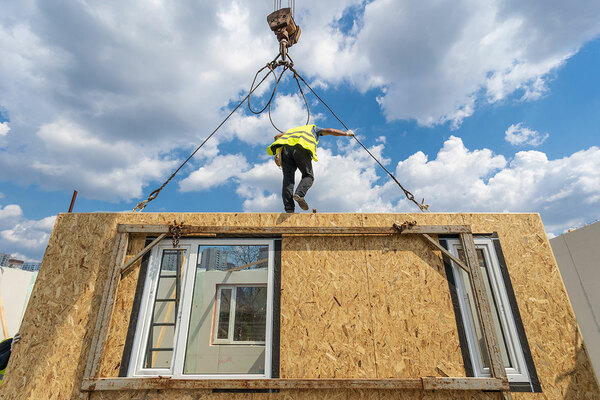You are viewing 1 of your 1 free articles

P...more
What impact will lockdown have on the private housing market?
Predictions of a quiet year for the housing market have proved wide of the mark. Dr Peter Williams asks what will the post-lockdown world look like?
“It will be a quiet year in the housing market.”
This might be the conclusion of the UK Housing Review 2020 on the private market, which was published and finalised before the coronavirus pandemic. How wrong can you be!
On 26 March, the Ministry of Housing, Communities and Local Government issued advice on moving homes during the outbreak.
Only the most necessary moves should take place, others should be delayed even if contracts have been exchanged. A housing market which was already struggling to get the numbers of transactions up to the historic average effectively came to a halt (though essential sales can continue).
A nascent early spring recovery was thus snuffed out. With valuers and buyers unable to visit properties, it is hard to see how any semblance of a normal market can continue until the lockdown is lifted.
Transactions were expected to plummet down perhaps 25% in March and then as much as 80% from April onwards.
The mortgage market was already in a degree of disarray some 10 days earlier. This was partly because on 17 March the government and the lending industry had announced a three-month payment holiday for borrowers in difficulty, which in turn had resulted in lenders being swamped with calls from those wanting to take advantage of it.
Lenders then moved to curtail the risks of lending and to preserve liquidity. In a hectic week and partly in response to the Bank of England cutting base rates twice, more than 1,000 mortgage products were taken off the market –especially tracker mortgages and those with high loan to value ratios.
A number of lenders either stopped lending or made their loans much less generous. The wholesale money market is also more expensive and this impacts on mortgage rates and availability while the securitisation market has effectively closed. And some key providers of loans to self-employed people and those outside the prime markets have not been granted access to the Bank of England’s support schemes.
So in the space of a couple of weeks we have seen a reworking of the housing and mortgage markets. There will clearly be an effect on house prices, though precisely how much remains uncertain and of course the geography will be complex. The Centre for Economics and Business Research suggests a drop of 13% in the year to March 2021, with prices 15% down from their peak by 2022.
Much turns on how long lockdown last and what the economy looks like on the other side. Market optimists argue in ‘favour’ of a short-term hit on prices, perhaps down 10%, but then a bounce back once we get through the crisis – a textbook economics view but the shape of the recovery could be very different. It is simply too soon to tell. Clearly estate agents will hope for nothing worse than this and their commentary influences the market.
However, housing supply has contracted rapidly and restarting it will take time. In England, the government plans to make the Help to Buy scheme more restricted in 2021 and to be replaced by 2023 look ever more unlikely, unless First Homes (for which the consultation period has been extended) really can become the new game changer. Help to Buy had helped boost government receipts, both via the repayments of equity loans at higher values and via increased stamp duty receipts – both are now threatened.
Although precise details vary, governments across the UK have affirmed that tenants will not face eviction due to financial hardship (or in Scotland for any reason) for varying periods of time (three months or more). With courts suspended, in reality any eviction is likely to take longer. The UK government has boosted the benefit system to give more help to renters while landlords in turn are eligible for payment holidays on any Buy to Let loan they might have.
“The review reported on rising first-time buyer numbers – the paradox is that these will now fall, even while affordability for those with a mortgage improves again”
However it is very likely that we will see rising arrears on both mortgages and rents and while payments might be suspended (or in the case of mortgages, capitalised), there will be long-term effects.
The UK Housing Review commentary captures the developing market dynamics as they were before coronavirus. One effect of the pandemic will almost inevitably be to shift the politics around the housing market to the extent that it is hard to see the government backing away from measures that help tenants, such as ending Section 21 evictions.
The review reported on rising first-time buyer numbers – the paradox is that these will now fall, even while affordability for those with a mortgage improves again.
Despite the widespread suspension of building work, it is clear that efforts are being made to continue remediation work on private blocks of flats. But even with this, once-trapped owners may still find there are no mortgages and no buyers so that their problems could stay unresolved for many more months.
There will be mounting pressure to expand affordable housing supply, which the review shows is still well below the required levels, even before the crisis. This is where the politics of housing in a post-coronavirus world will probably take us. ‘Homes for heroes’ was the rallying cry after the First World War and there will be echoes of that soon. Given that housebuilding is also a major tool to stimulate the economy, once we get back to a new ‘normal’ it might mean that housing will be a major beneficiary of any stimulus package – assuming the government can pay for it.
The UK Housing Review 2021 could well have a very different story to tell.
Dr Peter Williams, departmental fellow, Department of Land Economy, University of Cambridge











